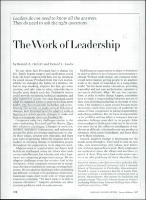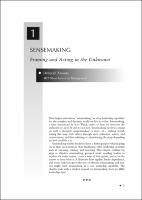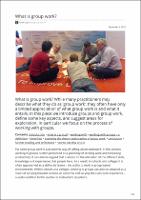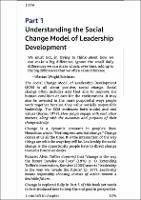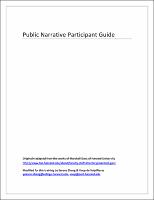Browsing 2. Leadership Development by Issue Date
Now showing items 1-14 of 14
-
The work of leadership
(Harvard Business School Publishing, 1997)
To stay alive, Jack Pritchard had to change his life. Triple bypass surgery and medication could help, the heart surgeon told him, but no technical fix could release Pritchard from his own responsibility for changing the habits of a lifetime. He had to stop smoking, improve his diet, get some exercise, and take time to relax, remembering to breathe more deeply each day. Pritchard’s doctor could provide sustaining technical expertise and take supportive action, but only Pritchard could adapt his ingrained habits to improve his long-term health. ... -
What is public narrative?
(2008) -
Sensemaking: framing and acting in the unknown
(2012)
This chapter introduces “sensemaking” as a key leadership capability for the complex and dynamic world we live in today. Sensemaking, a term introduced by Karl Weick, refers to how we structure the unknown so as to be able to act in it. Sensemaking involves coming up with a plausible understanding—a map—of a shifting world; testing this map with others through data collection, action, and conversation; and then refining, or abandoning, the map depending on how credible it is. Sensemaking enables leaders to have a better grasp of what is going ... -
What is group work?
(infed.org, 2012-12-05)
What is group work? While many practitioners may describe what they do as ‘group work’, they often have only a limited appreciation of what group work is and what it entails. In this piece we introduce groups and group work, define some key aspects, and suggest areas for exploration. In particular we focus on the process of working with groups. -
Lessons from 20 Years of Capacity Building for Health Systems Thinking
(2016-05-20)
In 2016, the Flagship Program for improving health systems performance and equity, a partnership for leadership development between the World Bank and the Harvard T.H. Chan School of Public Health and other institutions, celebrates 20 years of achievement. Set up at a time when development assistance for health was growing exponentially, the Flagship Program sought to bring systems thinking to efforts at health sector strengthening and reform. Capacity-building and knowledge transfer mechanisms are relatively easy to begin but hard to sustain, ... -
Voices in leadership: Ban Ki-moon
(The Harvard T.H. Chan, School of Public Health, 2017) -
Understanding the social change model of leadership development
(2017)
Leadership for a Better World provides an approachable introduction to the Social Change Model of Leadership Development (SCM), giving students a real-world context through which to explore the seven C's of leadership for social change as well as a approaches to socially responsible leadership. From individual, group, and community values through the mechanisms of societal change itself, this book provides fundamental coverage of this increasingly vital topic. Action items, reflection, and discussion questions throughout encourage students to ... -
The selfawareness questionaire
(2019-02) -
And the Word of the Year Is… “Resilience”
(2020-12-05) -
Emotional intelligence, leadership, and work teams: A hybrid literature review
(2023-09-20)
Emotional intelligence (EI) has been widely researched in different fields of knowledge. This paper reviews the literature on emotional intelligence, leadership, and teams in 104 peer-reviewed articles and reviews provided by the Web of Science and Scopus databases from 1998 to 2022. It is a hybrid or mixed review as it uses both quantitative and qualitative analysis techniques. The aims of this study are a performance analysis of the selected documents (years of publication, country, sectors, techniques used, most cited authors, authors with ... -
Public narrative participant guide
(Harvard University)
This workshop guide has been developed over the course of many trainings by Liz Pallatto, Joy Cushman, Jake Waxman, Kate Hilton, Tiffany Steinwert, Devon Anderson and many others. We welcome your suggestions for improving this guide further for future trainings. We also welcome you to use it and adapt it for your own trainings, subject to the restrictions below.

